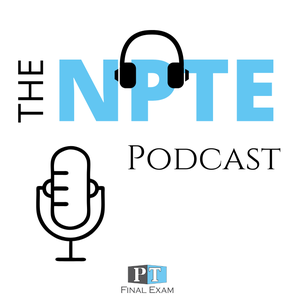
NPTE Clinical Files | Physical Therapy
Kyle Rice
NPTE Clinical Files is a podcast from the creator of Dominating the NPTE, hosted by Kyle Rice. NPTE Clinical Files explains a true clinical scenario in the form of a mock NPTE-based question. Each question is followed by a set of answer choices, where Dr. Kyle Rice explains the right answer with a detailed rationale. Each season covers all of the major systems and topics found in physical therapy and likely to be found on an NPTE. NPTE Clinical Files gives the Physical Therapist a weekly opportunity to solve clinical puzzles while learning the latest research related to the topic. Support this podcast: https://podcasters.spotify.com/pod/show/thepthustle/support
- 10 minutes 47 secondsStroke Rehabilitation Strategies
Hamza is 3 weeks post-stroke and presents with right-sided hemiparesis. He is able to sit unsupported but struggles to stand and has difficulty walking without assistance. His Brunnstrom stage is III for the right upper extremity and II for the right lower extremity. Which of the following interventions would be most appropriate for this patient to improve his functional mobility and independence?
A) Facilitate weight-bearing on the right lower extremity using assistive devices
B) Move the patient's right lower extremity through PNF patterns
C) Use body-weight-supported treadmill training (BWSTT)
D) Initiate fine motor activities for the right hand to improve hand dexterity
Join the FREE Facebook Group: www.nptegroup.com
8 January 2025, 11:00 am - 10 minutes 17 secondsShoulder Differential Diagnosis
Milani presents with anterior shoulder pain and reports difficulty with overhead activities. The patient describes intermittent clicking and discomfort with forward reaching. On examination, the therapist observes a positive Speed’s test, normal strength in external rotation, and no pain with passive shoulder elevation. Which of the following is the MOST likely diagnosis?
A. Bankart lesion
B. Subacromial bursitis
C. Biceps tendinopathy
D. Rotator cuff tendinopathy
DOWNLOAD THIS EPISODES CHEATSHEET:
1 January 2025, 11:00 am - 11 minutes 30 secondsNeurological Outcome Measures
Jeremy is performing a neurological evaluation. The therapist notes repeated falls in quiet standing with a suspected forward anticipatory balance impairment. Which of the following tests is MOST likely to reveal this specific impairment?
A) Functional Reach Test
B) Romberg Test
C) Sensory Organization Test
D) Standing in tandem with eyes closed
LINKS MENTIONED:
- NPTE Tips & Tricks: www.nptegroup.com
- Practice Question Club: www.npteclub.com
25 September 2024, 4:34 pm - 11 minutes 25 secondsOther Systems Differential Diagnosis
A 45-year-old female presents to physical therapy with complaints of persistent fatigue, and unexplained weight loss. Upon examination, the therapist notes tachycardia, low blood pressure episodes, and excessive sweating. Which of the following is the MOST likely diagnosis?
A) Graves Disease
B) Cor Pulmonale
C) Hypoglycemia
D) Adrenocortical hyperplasia
Links Mentioned:
- NPTE Tips & Tricks: www.nptegroup.com
- Truelearn: USE CODE: PTH020
18 September 2024, 9:00 am - 48 minutes 17 secondsWhat Would I Do Different After Passing The NPTE W/ Greg Todd
Are you a PT wondering where you'll find the money to pay off your student loan debt?
In this exclusive episode, Coach K and his long-term mentor and best friend Greg Todd discuss what they'd do differently after Passing the NPTE to build financial freedom.
Check out Greg's Exclusive Resources for Clinical Files Listeners Only!
- Side Hustle Checklist - https://smartsuccesshealthcare.com/sidehustlekr
- How to Prep for Job Interviews - https://smartsuccesshealthcare.com/interviewkr
- How to Build Your First Digital Product as a New Grad - https://smartsuccesshealthcare.com/digitalkr
12 September 2024, 10:00 am - 13 minutes 10 secondsCardio Exercise Prescription
Lina presents with a history of chronic heart failure, increased dyspnea and fatigue during daily activities. The physical therapist plans to implement an aerobic exercise program. Which of the following exercise protocols is MOST appropriate for this patient?
A) 70-85% of HRmax, 5 times per week, for 45-60 minutes
B) 50-60% of HRR, 3 times per week, for 20-40 minutes
C) 30-40% of HRmax, daily, for 10-15 minutes
D) 80-90% of HRR, 4 times per week, for 60 minutes
LINKS MENTIONED:
- NPTE Tips & Tricks: www.nptegroup.com
- Truelearn: USE CODE: PTH020
- Free Cheatsheets: www.nptecheatsheets.com
11 September 2024, 9:00 am - 10 minutes 51 secondsBurn Interventions 2
Bronny presents to the hospital with burns to the anterior neck, chest, axillas, and cubital fossa regions. Which of the following positions is the BEST for this patient?
A. Cervical slight extension, arm abduction with elbow extension
B. Neutral cervical spine, shoulder external rotation with wrist extension
C. Cervical slight flexion, arm elevated and elbow extended
D. Cervical extension with arm abduction and elbow flexion
LINKS MENTIONED:
- Practice Question Club: www.npteclub.com
- NPTE Tips & Tricks: www.nptegroup.com
4 September 2024, 9:00 am - 11 minutes 43 secondsPediatric Hypotonia
Cory is a 3 year old child presents with severe hypotonia. The child has difficulty maintaining an upright posture and frequently collapses when attempting to sit or stand. Which of the following interventions would be MOST appropriate?
A. Sitting balance exercises on an unstable surface such as a wobble cushion
B. Passive stretching of the hamstrings to improve flexibility
C. Practicing squats with support to encourage leg strength
D. Rhythmic stabilization exercises in a seated position on a therapy ball
LINKS MENTIONED:
- NPTE Tips & Tricks: www.nptegroup.co
- Free Cheatsheets: www.nptecheatsheets.com
28 August 2024, 9:00 am - 10 minutes 37 secondsGroin Pain Differential
Everett presents with right groin pain. Which of the following conditions must be ruled out FIRST?
A) Diverticulitis
B) L2 nerve root compression
C) Appendicitis
D) Psoas abscess
LINKS MENTIONED:
- Practice Question Club: www.npteclub.com
- NPTE Tips & Tricks: www.nptegroup.com
21 August 2024, 9:00 am - 11 minutes 37 secondsMSK Joint Mobility Intervention
Calen presents to physical therapy with difficulty grasping a glass. Upon examination, the patient has diminished joint mobility at the 2nd MCP and difficulty performing abduction of the digit. Which of the following glides is the MOST effective?
A. Volar glide
B. Dorsal glide
C. Radial glide
D. Medial glide
LINKS MENTIONED:
- NPTE Tips & Tricks: www.nptegroup.com
- Free Cheatsheets: www.nptecheatsheets.com
14 August 2024, 9:00 am - 12 minutes 58 secondsMSK Postural Examination
During a clinical evaluation, Aiyinde notices that a patient exhibits pronounced anterior pelvic tilt while standing but this posture significantly improves when the patient engages in a squat. This observation is MOST likely due to tightness in which of the following muscles?
A. Iliopsoas
B. Gluteus maximus
C. Rectus abdominis
D. Biceps femoris (long head)
LINKS MENTIONED:
- Practice Question Club: www.npteclub.com
- NPTE Tips & Tricks: www.nptegroup.com
7 August 2024, 9:00 am - More Episodes? Get the App
Your feedback is valuable to us. Should you encounter any bugs, glitches, lack of functionality or other problems, please email us on [email protected] or join Moon.FM Telegram Group where you can talk directly to the dev team who are happy to answer any queries.
 The Ask Mike Reinold Show
The Ask Mike Reinold Show
 NPTE Studycast | Physical Therapy
NPTE Studycast | Physical Therapy
 The NPTE Podcast
The NPTE Podcast
 JOSPT Insights
JOSPT Insights
 NPTE Final Frontier Podcast
NPTE Final Frontier Podcast
 The Sports Physical Therapy Podcast
The Sports Physical Therapy Podcast